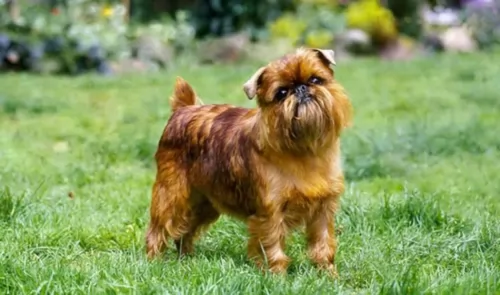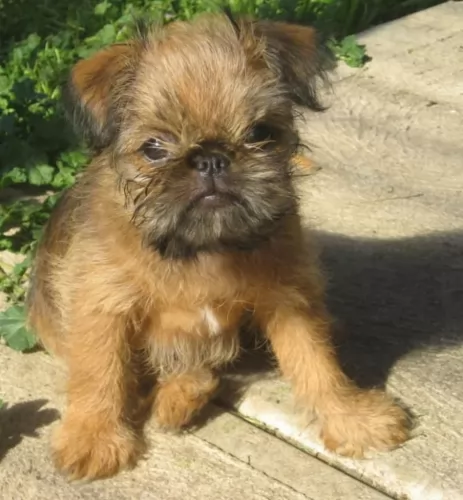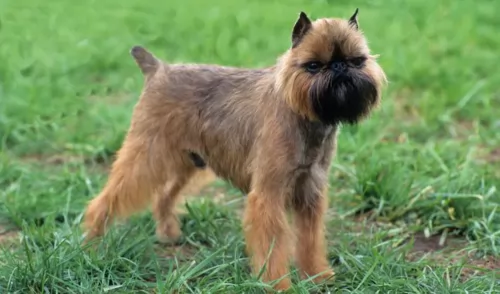 Petzlover
Petzlover Belgian Griffon is originated from Belgium but East European Shepherd is originated from Russia. Belgian Griffon may grow 56 cm / 22 inches shorter than East European Shepherd. Belgian Griffon may weigh 44 kg / 97 pounds lesser than East European Shepherd. Belgian Griffon may live 3 years more than East European Shepherd. Belgian Griffon may have less litter size than East European Shepherd. Both Belgian Griffon and East European Shepherd requires Moderate Maintenance.
Belgian Griffon is originated from Belgium but East European Shepherd is originated from Russia. Belgian Griffon may grow 56 cm / 22 inches shorter than East European Shepherd. Belgian Griffon may weigh 44 kg / 97 pounds lesser than East European Shepherd. Belgian Griffon may live 3 years more than East European Shepherd. Belgian Griffon may have less litter size than East European Shepherd. Both Belgian Griffon and East European Shepherd requires Moderate Maintenance.
 The Belgian Griffon isn’t your most attractive dog, but maybe its his quirky, gremlin looks that makes him such an adored pet for many. There are different varieties of Griffon, and the Belgian- and Brussels Griffon are one and the same. All small Belgian dogs have the same breed standards, with the Belgian having a rough coat The dog hails from Belguim and its ancestors were no doubt a mix of the Belgian street dog, the Stable Griffon and the Affenpinscher.
The Belgian Griffon isn’t your most attractive dog, but maybe its his quirky, gremlin looks that makes him such an adored pet for many. There are different varieties of Griffon, and the Belgian- and Brussels Griffon are one and the same. All small Belgian dogs have the same breed standards, with the Belgian having a rough coat The dog hails from Belguim and its ancestors were no doubt a mix of the Belgian street dog, the Stable Griffon and the Affenpinscher.
Later on in the 1800s, this combination was then crossed with the Pug, giving the dog the brachycephalic or flat faced look.
Unfortunately no written records were kept about the precise origin of this breed, but there is also the idea that the King Charles- and English Toy Spaniel were also involved in its development. These small dogs were bred to catch rats in the barns of European estates.
 The East European Shepherd is a dog which hails from Russia. The dog was developed in the 1930-1950s as there was a need for a bigger, more robust, weather-resistant type of dog who would perform all kinds of guard duties in the Soviet Union.
The East European Shepherd is a dog which hails from Russia. The dog was developed in the 1930-1950s as there was a need for a bigger, more robust, weather-resistant type of dog who would perform all kinds of guard duties in the Soviet Union.
This is a rare dog breed, created by mixing Russian breeds such as the Laika, Central Asian Shepherd and Caucasian Shepherd to create a strong working dog that could cope well with the sub-freezing conditions.
The standard breed type was established in 1964. The only major kennel club to grant full recognition to the East-European Shepherd is the Russian Kennel Club. In the United States, the dog is recognized by a number of rare breed registries.
 There are different variations of this dog to give it its distinctive look and size. This quaint looking little Griffon canine comes with two different coat types - soft or wiry. With the Belgian Griffon, his wiry coat of red, tan or black will need to be brushed at least twice a week. Shedding with this dog is seasonal.
There are different variations of this dog to give it its distinctive look and size. This quaint looking little Griffon canine comes with two different coat types - soft or wiry. With the Belgian Griffon, his wiry coat of red, tan or black will need to be brushed at least twice a week. Shedding with this dog is seasonal.
He has a compact, sturdy little body, and he trots around with attitude. With his sharp pointed ears and whiskers, he has been given the nickname ‘bearded dog’. His dark black eyes are alert. He is self-confident, intelligent and curious breed, a great family pet and good with children if he has grown up with them in the home. He is good with other pets. The fact that this is a small breed and that he doesn’t have excessive energy levels, means he is adaptable to city- and country living.
 The East European Shepherd is larger than a German Shepherd. He is described as a large dog with males and females standing roughly at 66-76 centimeters at the withers and weighing anything between 30–50kg.
The East European Shepherd is larger than a German Shepherd. He is described as a large dog with males and females standing roughly at 66-76 centimeters at the withers and weighing anything between 30–50kg.
The coat with undercoat is medium in length with the standard color being black-and-tan or black-and-red. The dog is solid colored or is light fawn or tan in color with black saddle.
The face of the dog is black and he looks a lot like a wolf in appearance. The ears of the East European Shepherd are medium sized and always erect.The tail is long and hangs low.
The East European Shepherd is an intelligent and confident dog and can be aggressive when aggravated. He is a working dog and to get along with other pets in the home as well as children, the East European Shepherd will need to be trained and socialized, becoming obedient and loyal with his owner.
He is an intelligent dog and training him poses no problem. Loyal and devoted, this dog mostly becomes particularly attached to one member of the family.
There are a number of dog experts who don’t recommend the dog as a family pet as it is a dog reluctant to form a close bond with a child, being irritated by them, especially ill disciplined children.
It is a strong-willed dog too and shouldn’t be the first dog choice for a novice dog owner. They make excellent guard dogs and take their role as protector of the family seriously.
 The Belgian Griffon is an affectionate pet and often establishes a strong bond with one member of the family. You’ll have your Griffon with you for about 15 years so make sure he is trained and a pleasure to have around.They are difficult to train, being somewhat stubborn so they are going to require patience. They’re sensitive too, and they won’t respond well to aggressive treatment.
The Belgian Griffon is an affectionate pet and often establishes a strong bond with one member of the family. You’ll have your Griffon with you for about 15 years so make sure he is trained and a pleasure to have around.They are difficult to train, being somewhat stubborn so they are going to require patience. They’re sensitive too, and they won’t respond well to aggressive treatment.
They’re much more indoor dogs than outdoor dogs because they’re also vulnerable to heat stroke. They just want to come indoors and be with their human family, and when you do that for them, they’ll become a wonderful friend and companion to you.
 The East-European Shepherd dogs are balanced, confident, intelligent, loving and playful while also being tough and protective of their owners.
The East-European Shepherd dogs are balanced, confident, intelligent, loving and playful while also being tough and protective of their owners.
They make fantastic guard dogs, becoming aggressive around strangers whom they don’t trust. When you bring a dog like this into the home, it is essential to have him trained and socialized and to also have a firm owner who can deal with such a strong-willed animal.
He is an active, alert dog who will require regular exercise and will slot into life in the city or in the country so long as his exercise needs are met.
When you look after your East European Shepherd you’ll find in him a devoted, loyal friend who will protect you with his life.
 When you get your Griffon from a reputable breeder, you always have a better chance that he’ll be healthy. As it is, the Belgian Griffon has few hereditary health issues. However his dark eyes will have some genetic problems to contend with and he could suffer with progressive retinal atrophy. This is an illness which can lead to blindness
When you get your Griffon from a reputable breeder, you always have a better chance that he’ll be healthy. As it is, the Belgian Griffon has few hereditary health issues. However his dark eyes will have some genetic problems to contend with and he could suffer with progressive retinal atrophy. This is an illness which can lead to blindness
Syringomyelia – this is a neurological condition – an abnormality of the spinal cord – a disease which occurs more frequently in small breeds. It can cause your pet to endure a lot of pain.
Birthing Issues - these little dogs often have problems with giving birth, and a vet often has to intervene and perform a cesarean.
 Regarded as a tough dog who can reach 10 – 12 years of age, the East European Shepherd is prone to hip or elbow dysplasia. This is a a disease that is more prevalent with German Shepherd type dogs.
Regarded as a tough dog who can reach 10 – 12 years of age, the East European Shepherd is prone to hip or elbow dysplasia. This is a a disease that is more prevalent with German Shepherd type dogs.
Dysplasia is a genetic condition which can lead to inflammation and arthritis and even lameness. Unfortunately it can happen with young dogs too, and the vet will suggest different types of treatment which can include surgery.
Degenerative myelopathy is another degenerative disease which can be found with the East European Shepherd. It is a fatal, progressive degenerative disease of the spinal cord. Unfortunately there isn’t treatment for the disease, leading to paralysis of the limbs.
 The Belgian Griffon will do well if you invest in high quality foods. You can make your own, but if you’re concerned about his health, it would be best to check what ingredients should go into his home-prepared meals to ensure he gets all the vitamins and minerals he needs.
The Belgian Griffon will do well if you invest in high quality foods. You can make your own, but if you’re concerned about his health, it would be best to check what ingredients should go into his home-prepared meals to ensure he gets all the vitamins and minerals he needs.
If you want to go with commercially manufactured dog foods, check with your vet about wet- and dry foods. Your vet will help with choosing a food appropriate to his size and age. Always ensure that there is clean, fresh water available to your pet.
Even though he is a small breed, he is fairly active and he will need his fair share of exercise like ball games and walks. Training and socialization are a must for him. You’ll notice that training isn’t particularly easy with this breed, and first time dog owners might not have the patience with him.
 The coat of the East European Shepherd is thick, and while he won’t require any professional grooming, he will require being brushed at least twice a week. This is because he sheds heavily at certain times.
The coat of the East European Shepherd is thick, and while he won’t require any professional grooming, he will require being brushed at least twice a week. This is because he sheds heavily at certain times.
His nails will need to be clipped if they don’t wear down naturally, and his teeth will require regular brushing at least 2 or 3 times a week. Fortunately, because his ears are large and open, he doesn’t easily get an ear infection.
The East European Shepherd is a dog which has always been worked. It is a highly energetic dog and its role as a guard- and herding dog has made it that the dog will require a good dose of exercise.
A long walk may not be enough for this active dog, and he will require intense ball throwing with a tennis racquet to get the ball far away so that he can run far to fetch the ball. Without enough exercise, the East-European Shepherd will develop behavioral problems which will include aggression.